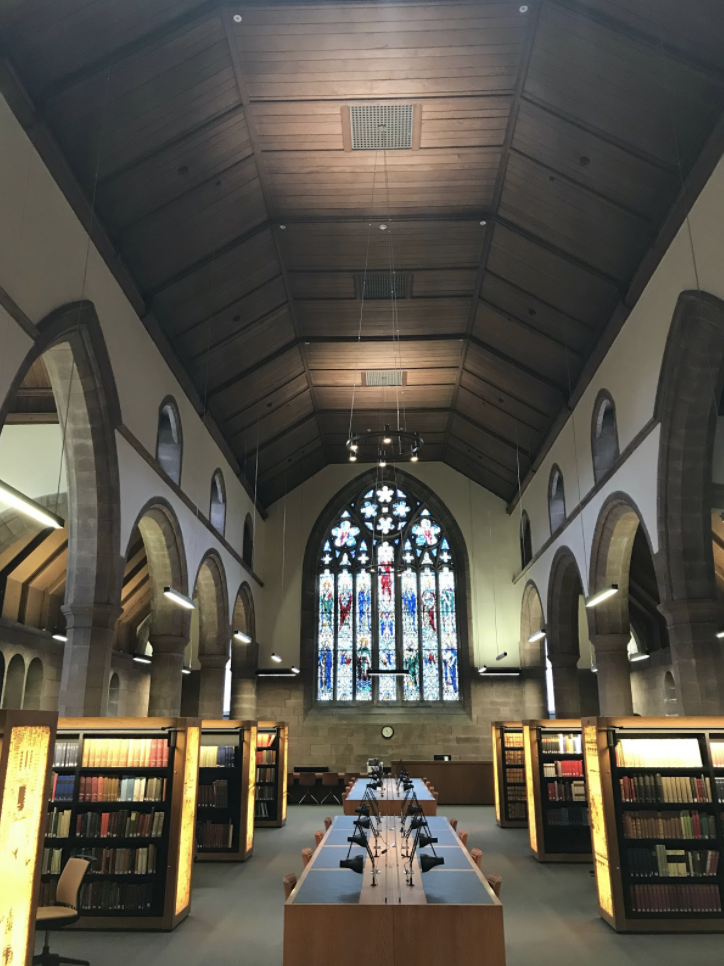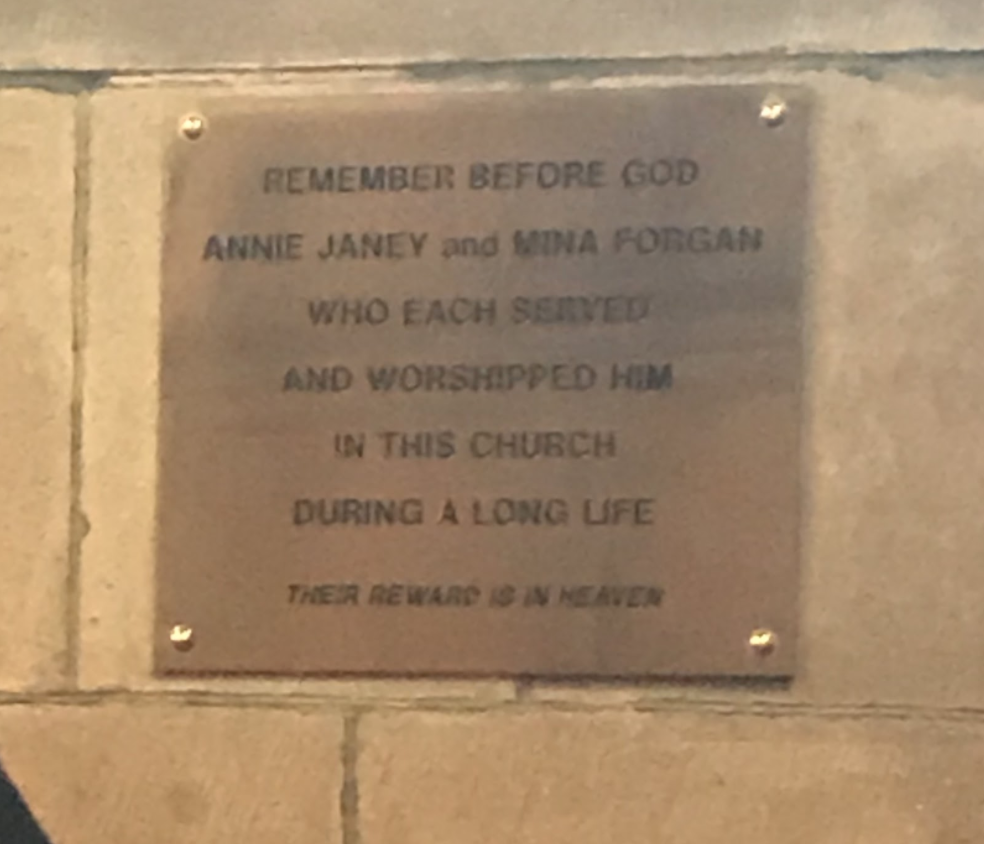Good morning, all! This morning, my coffee cup is a relic from my time in Scotland. It’s a bit touristy, but it was the only one they had at the St Andrews Starbucks that day, so I got it…

This was my go-to coffee cup for a while. I’d fill this sucker up then be off to study. While in St Andrews, one of my

One day, I was studying, with this coffee cup in hand, tucked off to the side in this room. From where the picture is taken, off to the right (off the picture). Tucked away in the corner, just by my seat that day, was this little plaque:

I’m not sure why, but the plaque struck me that day. I’m working hard on my dissertation and, as I’m sure you are, hoping to do “great” things. But to have someone say this about me would be far greater than anything I can accomplish in my career. I have no idea who Annie & Mina are—and chances are few people do. But I know they were faithful worshippers of God who served him during their lives. May that be said of us, too.
—
O God, who by the glorious resurrection of your Son Jesus Christ destroyed death and brought life and immortality to light: Grant that we, who have been raised with him, may abide in his presence and rejoice in the hope of eternal glory; through Jesus Christ our Lord, to whom, with you and the Holy Spirit, be honor and glory, now and for ever. Amen.
With that, let’s jump into the text for today.
Therefore, my beloved, just as you have always obeyed me, not only in my presence, but much more now in my absence, work out your own salvation with fear and trembling; 13 for it is God who is at work in you, enabling you both to will and to work for his good pleasure. (Philippians 2:12-13)
Let’s just say it: this is a tricky passage.
Tomorrow, we’ll have another guest writer—it’s a surprise!—but I offered him either today’s passage or tomorrow’s, and he picked tomorrow’s because he was afraid of this one! The coward… and so he leaves me to the wolves.
The reason this passage is a little thorny is because it’s controversial. The question, in short, is the degree to which we are involved in our salvation. In other words, how does my own free choice effect, if at all, God’s grace?
Notice two things the passage says,
“work out your own salvation with fear and trembling”
and
“it is God who is at work in you”
Paul rejects any complete either/or. He instructs the Philippians to work out their salvation, but it is equally as clear that God is at work. If we lose either component, we lose the gospel Paul preaches.
Elsewhere, Paul clearly states that God “desires everyone to be saved and to come to know the truth” (1 Timothy 2:4). That is what God desires, this is what God is working toward, this is why Jesus dies on the cross.
But… not everyone is saved. Not everyone has come to know the truth. What gives?
As Paul does, Peter also speaks of those who reject Jesus (1 Peter 2:7). It’s not God’s design, but some people simply do not want God’s gift of eternal life. God gives a gift, but some choose not to open it. This means we can reject the gospel. It’s the only way God can truly be loving, since there is no such thing as forced or coerced love. Love must be freely given and freely chosen. God loves us, but he does not force us to love him back.
However, we should never imagine that we then save ourselves—not a chance! In fact, saving ourselves is literally impossible. It is only by grace that we are saved. Grace means literally “gift.” But as with any gift—be it a sweater from your aunt and uncle or a million dollars or eternal life—it can be rejected. And when it is, we don’t get the benefits that gift entails.
God does the work, but he invites us to cooperate with him in his work.
—
Now, that’s out of the way. So how does it work? How do we “work out our salvation” but also “God works in us?”
The 4th century theologian Gregory of Nyssa addresses this question in an interesting way. According to him, we are charged with living a virtuous life, but that does not mean we do “good” things in order to please God. Instead, our virtue is actually just participation in the life of God.
He says those who “participate in the Good receive increase and growth in that they encounter even greater and better things.” What he means by “the Good” is God. God is not “good,” like say some person is good, but God is Goodness itself. Good does not exist apart from God.
This means, then, when we live a good, righteous, and virtuous life, we are not doing good things ourselves, but we are participating in the Goodness of God. Our own good deeds are simply God’s goodness, done by us in his grace.
—
So what do we take away from this?
I think this: we should never try to do good things or “work out our salvation” on our own, but throw ourselves deeper into the grace of God. Living a life of virtue, or working out our salvation, is not just something we do, but something God does in us.
We tend to think in categories. So, on one hand, I’ve got my moral life over here, I’ve got my life of worship over here, I’ve got my social life over here, I’ve got my relationship with Jesus here, and so on. But we cannot break it up like this. The moral life, or doing “good deeds,” requires a relationship with Jesus. It requires a life of worship.
The Spirit weaves in us the goodness of God’s own life. That is what allows us to “work out our salvation.” The best thing we can “do” is increase, more and more, our dependence on the source of all good things—God.
Let’s pray.
Lord Jesus, Master Carpenter of Nazareth, on the Cross through wood and nails you wrought our full salvation: Wield well your tools in this, your workshop, that we who come to you rough-hewn may be fashioned into a truer beauty by your hand; who with the Father and the Holy Spirit live and reign, one God, world without end. Amen. (BCP 2019)
Grace and peace, see you tomorrow!



